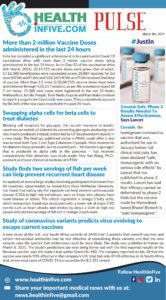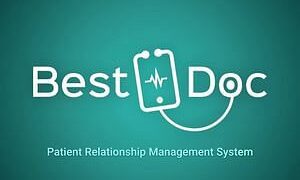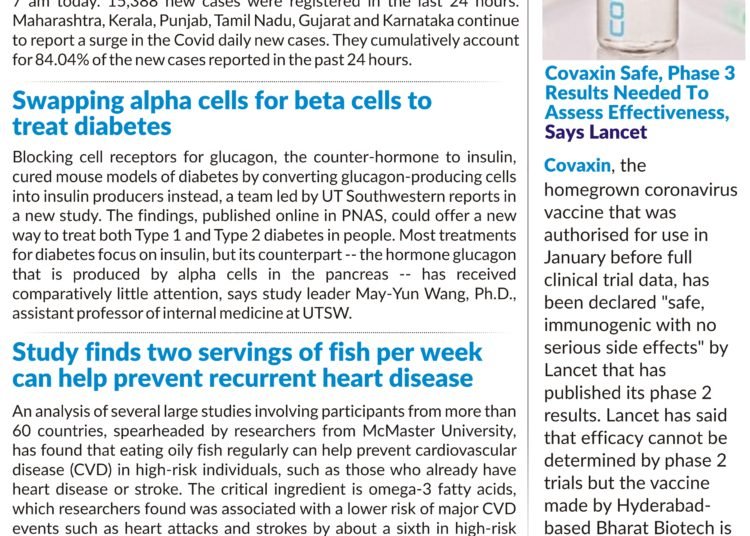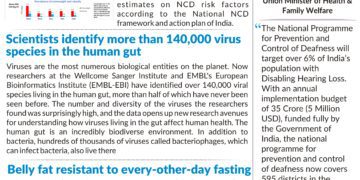#JustIn
Covaxin Safe, Phase 3 Results Needed To Assess Effectiveness, Says Lancet
Covaxin, the homegrown coronavirus vaccine that was authorised for use in January before full clinical trial data, has been declared “safe, immunogenic with no serious side effects” by Lancet that has published its phase 2 results. Lancet has said that efficacy cannot be determined by phase 2 trials but the vaccine made by Hyderabad-based Bharat Biotech is “safe/immunogenic”.
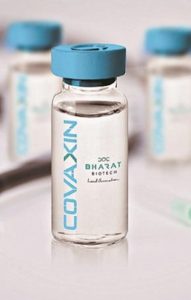
More than 2 million Vaccine Doses administered in the last 24 hours
India has recorded a significant achievement in its countrywide Covid-19 vaccination drive with more than 2 million vaccine doses being administered in the last 24 hours. As on Day-52 of the vaccination drive (8th March, 2021), 20,19,723 vaccine doses were given. Out of which, 17,15,380 beneficiaries were vaccinated across 28,884 sessions for 1st dose (HCWs and FLWs) and 3,04,343 HCWs and FLWs received 2nd dose of vaccine. More than 2.3 crore (2,30,08,733) vaccine doses have been administered through 4,05,517 sessions, as per the provisional report till 7 am today. 15,388 new cases were registered in the last 24 hours. Maharashtra, Kerala, Punjab, Tamil Nadu, Gujarat and Karnataka continue to report a surge in the Covid daily new cases. They cumulatively account for 84.04% of the new cases reported in the past 24 hours.
Swapping alpha cells for beta cells to treat diabetes
Blocking cell receptors for glucagon, the counter-hormone to insulin, cured mouse models of diabetes by converting glucagon-producing cells into insulin producers instead, a team led by UT Southwestern reports in a new study. The findings, published online in PNAS, could offer a new way to treat both Type 1 and Type 2 diabetes in people. Most treatments for diabetes focus on insulin, but its counterpart — the hormone glucagon that is produced by alpha cells in the pancreas — has received comparatively little attention, says study leader May-Yun Wang, Ph.D., assistant professor of internal medicine at UTSW.
Study finds two servings of fish per week can help prevent recurrent heart disease
An analysis of several large studies involving participants from more than 60 countries, spearheaded by researchers from McMaster University, has found that eating oily fish regularly can help prevent cardiovascular disease (CVD) in high-risk individuals, such as those who already have heart disease or stroke. The critical ingredient is omega-3 fatty acids, which researchers found was associated with a lower risk of major CVD events such as heart attacks and strokes by about a sixth in high-risk people who ate two servings of fish rich in omega-3 each week.
Study of coronavirus variants predicts virus evolving to escape current vaccines
A new study of the U.K. and South Africa variants of SARS-CoV-2 predicts that current vaccines and certain monoclonal antibodies may be less effective at neutralizing these variants and that the new variants raise the specter that reinfections could be more likely. The study was published in Nature on March 8, 2021. The study’s predictions are now being borne out with the first reported results of the Novavax vaccine, says the study’s lead author David Ho, MD. The company reported on Jan. 28 that the vaccine was nearly 90% effective in the company’s U.K. trial, but only 49.4% effective in its South Africa trial, where most cases of COVID-19 are caused by the B.1.351 variant.
Follow Health In Five on LinkedIn, Facebook, Twitter & Instagram
Subscribe on WhatsApp & Telegram to receive real time updates
